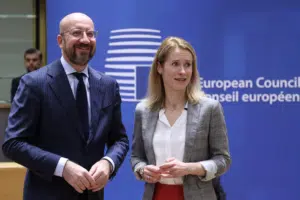Brussels – A “medal of valour” for “unyielding” support in defence of the “principles on which the European Union was founded.” This is how European Council President, Charles Michel, summed up the Union’s solidarity with the Estonian Prime Minister, Kaja Kallas, following the news that arrived earlier today (December 13) about the Baltic country’s leader being included on Russia’s international wanted list. “We will not be intimidated by the Kremlin’s warmongers,” Michel made clear on behalf of the twenty-seven countries.

This is the first time that a head of state or government has been placed on the blacklist of Russia’s international wanted list. The decision was motivated by Kremlin spokesman Dmitry Peskov for “hostile acts against our historical memory,” i.e., the destruction of monuments dedicated to Soviet soldiers after the start of the Russian invasion of Ukraine. Since February 24, 2022, Kallas has carved out a role for herself as an irreproachable leader at Kyiv’s side—among the most determined at the table of the 27 EU leaders—and may be in the running to succeed Norwegian Jens Stoltenberg as the new NATO secretary general. Since the invasion of Ukraine began, the premier of Estonia (supported in her actions by confirmation at the polls last year) has ordered the removal of hundreds of Soviet-era monuments built up to the country’s declaration of independence in 1991.
“Russia’s move is not surprising; this is yet more proof that I’m doing the right thing: the EU’s strong support for Ukraine is a success, and it hurts Russia,” PM Kallas herself commented in a post on X (immediately shared by the President of the European Commission, Ursula von der Leyen). “Throughout history, Russia has hidden its repressions behind so-called law enforcement; I know this from my family history,” the Estonian premier continued, referring to the KGB arrest warrant for the deportation of her grandmother and mother to Siberia in Soviet times: “The Kremlin now hopes that this move will serve to silence me and others, but it will not, on the contrary, I will continue to support Ukraine strongly” and “the increased defence of Europe.”

The Prime Minister of Estonia, Kaja Kallas (credits: Raigo Pajula/Afp)
Words of solidarity also came from Madrid: “Putin’s move is another proof of your courage and Estonia’s leadership in the defense of democracy and freedom,” sided with Kallas the Spanish premier, Padro Sánchez. So did the former prime minister of Belgium (between 1999 and 2008), Guy Verhofstadt: “As someone who has been blacklisted by Russia since 2015, welcome Kaja Kallas; it is an honour to be recognized as a staunch opponent of the Russian terrorist state,” commented sarcastically the liberal MEP, stressing forcefully, however, that “inserting a current EU leader on a wanted list must result in tougher EU sanctions and real steps toward a defence union.” A message similar to the one expressed also by the European Alde party—to which Kallas’ Estonian Reform Party belongs-—reiterating how “liberals will not back down” in the fight “for freedom in Europe”. Referring to the Tallinn leader’s post, Italia Viva MEP and Vice-President of Renew Europe’s group in the EU Parliament, Nicola Danti, made it clear that “her words are the words of all of us” and that “Kallas is a courageous woman, a true pro-European and a reference” for the liberal group in Brussels.
English version by the Translation Service of Withub





